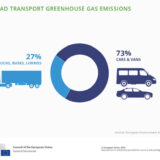
EU Parliament’s Euro 7 vote a step forward, but not enough, says ACEA
On October 12, 2023, in Brussels, Belgium, the European Automobile Manufacturers’ Association (ACEA) expressed mixed feelings about the European Parliament’s recent decision on Euro 7 pollutant standards. While the vote showed some alignment with the auto industry’s concerns, ACEA believes there’s room for further refinement.
Sigrid de Vries, director general of ACEA, highlighted the association’s ongoing efforts to advocate for realistic Euro 7 targets and testing conditions. These should not render vehicles unaffordable or compromise the competitiveness of the industry, especially when the environmental benefits are minimal. The Environment Committee’s (ENVI) vote has made progress over the initial proposal by the European Commission but still lacks in certain areas, according to de Vries.
European vehicle manufacturers have made significant strides in reducing pollutant emissions over the years. The transition from the first Euro standard to Euro 6 saw more than a 90% reduction in emissions. The proposed Euro 7 is expected to offer marginal additional benefits, according to ACEA. The organisation that represents 14 major Europe-based car, van, truck and bus makers argues that air quality improvements could be more effectively achieved by replacing older vehicles with efficient Euro 6 models, alongside the ongoing shift towards electrification.
The Euro 7 regulatory proposal, introduced by the European Commission, aims to further diminish pollutant emissions from various vehicles, including cars, vans, trucks, and buses. As the plenary Parliament vote approaches next month, ACEA is calling on members of the European Parliament (MEPs) to support a balanced and reasonable Euro 7 regulation.












.jpg)
